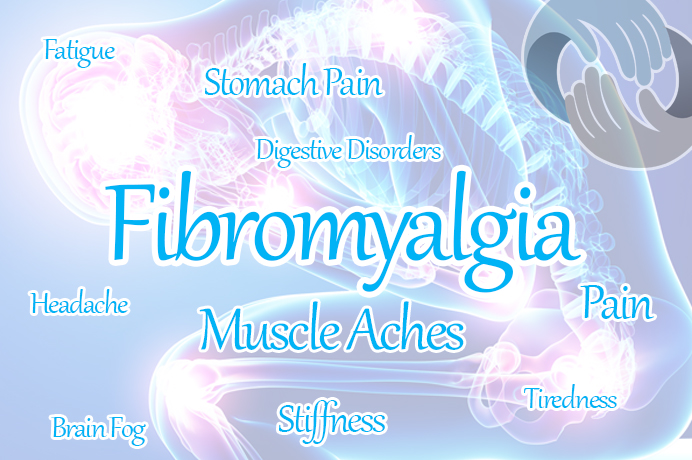 Glasgow
Glasgow
Massage Is a Fantastic Therapy Option for Fibromyalgia Patients

Fibromyalgia is a chronic pain condition that includes musculoskeletal pain, fatigue, and sleep problems and affects approximately 2% 4% of the adult population. About 80% of fibromyalgia patients are women.
3 Main Symptoms of Fibromyalgia
Fibromyalgia results in widespread pain in all four quadrants of your body, for more than three consecutive weeks. Traditionally, there were 18 specific tender points that needed to be tender for a fibromyalgia diagnosis, but this is no longer a requirement. Now, diagnosis is done through elimination of other conditions that can cause the same symptoms combined with ongoing, widespread pain for over three weeks. Getting a diagnosis of fibromyalgia can be an extremely difficult and complex endeavor, as symptoms mimic other conditions and come and go without clear reason or triggers.
- Sleep disturbances are significant in fibromyalgia, including insomnia and frequent waking during the night due to pain.
- Chronic fatigue is also very common, as often those with fibromyalgia wake feeling tired even when they have slept through the night. Studies have shown that patients experiencing pain after surgery show disturbed sleep, specifically rapid eye movement (REM) sleep. Fibromyalgia patients also experience these disturbances during the deepest stages of sleep, when recovery and repair to the body takes place. This results in waking feeling tired and fatigued, as well as with a lack of recovery in muscle tissue, which results in more pain . . . then more sleep disturbances . . . then more pain. This pain/sleep disturbance cycle is ongoing in fibromyalgia patients, and is the underlying cause of the chronic fatigue that they experience.
- Cognitive difficulties, or fibro fog, also occur in most fibromyalgia sufferers at least on occasion. This fibro fog is often a result of the constant pain and disturbances to restorative sleep that occur. Anyone who has suffered from pain, even a garden variety pulled muscle or headache, knows that it leaves you feeling exhausted and makes mental concentration difficult. Being in constant, daily pain, with ongoing sleep disturbances, makes it an everyday challenge for fibromyalgia sufferers to concentrate.
Other conditions often accompany fibromyalgia, including migraines and headaches, irritable bowel syndrome (IBS), and other autoimmune diseases including lupus or rheumatoid arthritis. Inflammation is a major component of fibromyalgia, which increases the incident of many autoimmune diseases as well as the symptoms of any preexisting autoimmune or inflammation based conditions. This contributes significantly to the difficulties of diagnosing fibromyalgia.
Treatments for Fibromyalgia
Treatment for fibromyalgia usually involves over-the-counter pain relievers and can require prescription pain medications when the condition flares up. Antidepressants often help to reduce the pain and fatigue that accompanies fibromyalgia, and can help improve sleep. Anti-seizure drugs are often used to reduce pain and fibromyalgia symptoms.
Studies have shown that, while exercise is a major contributing factor in reducing symptoms of fibromyalgia, heavy weight lifting or strenuous exercise may trigger flare ups of symptoms. Low impact cardiovascular exercise, like walking, biking or rowing, has been shown to help manage symptoms long term. The increase in circulation improves oxygenation throughout your body and helps to reduce inflammation and pain. Yoga, tai chi, and qigong have been shown to reduce pain by improving flexibility and can also improve sleep, a key component in reducing fibromyalgia symptoms.
How Massage Therapy Can Improve Symptoms of Fibromyalgia
Alternative treatments such as massage therapy have also been shown to greatly improve symptoms of this chronic condition.
Massage therapy has been shown to:
- reduce headaches and migraines
- reduce anxiety and depression
- improve mental clarity
- improve restorative and restful sleep
- reduce muscle tension
All of these outcomes greatly improve the symptoms of fibromyalgia, making massage a fantastic therapy option for these patients.
Massages
Swedish Massage
Sports Massage
Deep Tissue Massage
Lymphatic Drainage
Myofascial Release
Oncology Massage
Electrotherapy
Aromatherapy Massage
Relaxation Massage
Candle Massage
Hot Stone Massage
Four Hands Massage
Hot Oil Massage
Lomi Lomi Massage
Relax And Therapy Massage
Warm Bamboo Massage
Balinese Massage
Kobido Massage
Natural Lift Face Massage
Anti-Cellulite Massage
Norel Facial Treatments
Gua Sha Massage
Reflexology Massage
Indian Head Massage
Thai Foot Massage
Pregnancy Massage
Menopause Massage
Hot Stone Lomi Lomi Massage
Revive and Thrive - The Runners Relief
Special Offers
Lomi Lomi Massage 60min

60-Minute Lomi Lomi Massage - Full Body - £60 - Offer Ends 30/04/2025
Book NowAromatherapy Massage 45min

45-Minute Aromatherapy Massage - Back, Neck, Shoulders - £45 - Offer Ends 30/04/2025
Book NowRebook and Save

Rebook your massage once your visit is completed and receive a £10 discount towards your next 40min treatment or longer.
Learn More10% NHS Staff and Students Discount

Please use discount code NHS10 or STUDENT10 and bring your NHS or Student ID with you.
Book Now10% Blue Light Card

10% Blue Light Card Discount Please use discount code BLUE10 and bring your Blue Light Card with you.
Book Now










